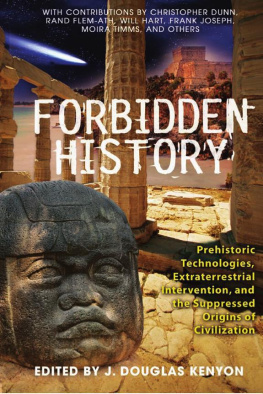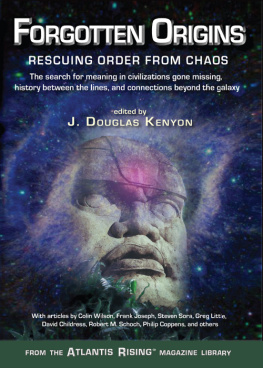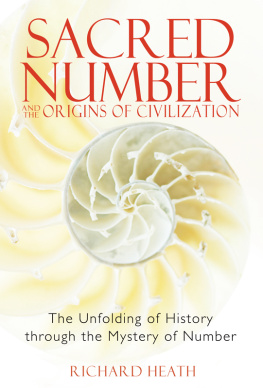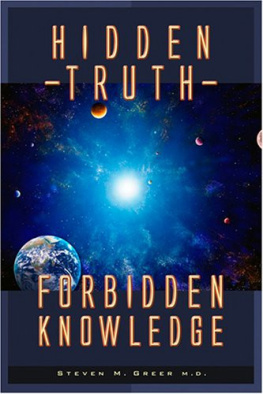
To the growing number of scientists and scholars willing to risk their professional prestige, perks, and privileges for the sake of something as ephemeral as the truth.

ACKNOWLEDGMENTS
Were it not for Atlantis Risinga bimonthly magazineand associated projects, this book would not have been possible. All of the resources that for the last ten years have gone into the making of that periodical have also served to create this book. The people who helped to actualize Atlantis Rising are the same ones who made Forbidden History a reality. And while it is true that this book represents only a small sampling of Atlantis Risings material it is nevertheless representative of the very best that the magazine has to offer. We are, of course, indebted, not only to the many thoughtful authors who contributed to the content of the current pages of the book, but to the magazines many other fine writers as well, who though they could not be included here, may yet find their efforts incorporated into future works.
In thanking those who have made this collective endeavor possible (which includes this book, the magazine, the educational videos, and our Web site: AtlantisRising.com), I must first acknowledge my lovely wife, Patricia. Without her loyal support and selfless cooperation, I probably would have spent the last decade in much less productive pursuits. High on the list are also my parentsmy late father, John B. Kenyon, D.D., whose own questioning of conventional wisdom catalyzed my thinking at a very early age, and my mother, Bessie, who always backed me in everything I did, in every way she could, with every resource at her command.
Among the stalwart supporters who deserve special thanks are my original financial backers, John Fanuzzi, Gregory Mascari, and Michael Stern, as well as Bob and Judy Colee. A few years later Greg Hedgecock (since deceased), his wife, Dianne, and their son, Cooper, put their shoulders to the wheel and helped to stabilize what was then a somewhat shaky operation. Without the generous help of these extraordinary people, this book would certainly have never come about.
Deserving of special credit here is my partner of many years, Tom Miller, whose brilliant artistic contributions to our early covers helped to set us apart from the competition. Without his participation in so much of the thinking that went into our projects, it is difficult to imagine how things could have unfolded as wonderfully as they did.
Certainly no list of crucial helpers would be complete without Darsi Vanatta, whose diligent and tireless efforts in managing the Atlantis Rising office for some years now have kept everything working smoothly and growing at a very healthy pace.
There are many others whom I could also thank, but space here is limited, so I will simply say: You know who you are and you know what your contributions have been. Rest assured that you are not forgotten, nor are your efforts unappreciated. You know how much they mean to me, and how much I thank you for them.
J. DOUGLAS KENYON, EDITOR AND PUBLISHER
ATLANTIS RISING MAGAZINE
Table of Contents
1.
Will Hart
2.
David Lewis
3.
J. Douglas Kenyon
4.
William P. Eigles
5.
David Lewis
6.
Peter Bros
7.
John Kettler
8.
Steve Parsons
9.
Mel and Amy Acheson
10.
David Lewis
11.
J. Douglas Kenyon
12.
Robert M. Schoch, Ph.D.
13.
Joseph Ray, Ph.D.
14.
J. Douglas Kenyon
15.
Will Hart
16.
Moira Timms
17.
J. Douglas Kenyon
18.
Frank Joseph
19.
Frank Joseph
20.
Frank Joseph
21.
J. Douglas Kenyon
22.
Rand Flem-Ath
23.
Frank Joseph
24.
J. Douglas Kenyon
25.
David Lewis
26.
J. Douglas Kenyon
27.
Will Hart
28.
Frank Joseph
29.
Will Hart
30.
Christopher Dunn
31.
Christopher Dunn
32.
Christopher Dunn
33.
Christopher Dunn
34.
Christopher Dunn
35.
Christopher Dunn
36.
Christopher Dunn
37.
Chistopher Dunn
38.
Marshall Payn
39.
J. Douglas Kenyon
40.
J. Douglas Kenyon
41.
Len Kasten
42.
David Lewis
Introduction
J. Douglas Kenyon
J ust a few centuries after what the experts say was the first great laborsaving invention of the ancient worldthe wheelsociety crossed a major threshold and headed irreversibly toward the modern world. More than anything else, it was the wheel, we are told, that revolutionized primitive society and set the stage for the great achievements that were to follow. The prevailing assumption is that the rise of highly organized society was unprecedented; such is the conventional scenario for the dawn of civilization on Earth.
After all, it is argued, if there had been an earlier, advanced civilization we would have discovered unmistakable evidence of its existence. Presumably, we would have seen the remains of its highways, and bridges, and electrical wiring. We would have found its plastic bottles, its city dumps, and its CD-ROMs. Those are, after all, the things we will leave behind for future archeologists to puzzle over.
But could an ancient civilization have risen to heights similar to our own, yet have traveled a different road? What would we understand of a world that might have employed fundamentally differentthough no less effectivetechniques to harness the forces of nature? Would we, or could we, comprehend a world capable of, for example, creating and transmitting energy by means other than a power grid, traveling great distances without internal combustion engines, or making highly complex calculations involving earth science and astronomy without electronic computers?
Do we have the grace to recognize and respect achievements other than our own, or must we take the easy way out and resort to crude stereotyping of our mysterious primitive ancestors, dismissing out of hand anything we dont immediately understand? Indeed there are some, including many contributors to this book, who would argue that the evidence of a great but forgotten fountainhead of civilization is overwhelming and needs, at last, to be given its proper due.
Forbidden History, a compilation of essays gathered over time from the magazine Atlantis Rising, aims to put forward such evidence, and to propose ideas and theories with regard to the origins of life and the human race itself that may very well be more in accordance with reality than currently prevailing orthodoxy. In proposing these ideas, we hope to pose some interesting and provocative questions.
For example, could todays reigning conception of the limits of prehistoric society be but another in the long line of self-serving conceits to which our ruling elite, if not our flesh, is heir? Take, for instance, the Darwinian/Uniformitarian view of history, which argues that our world is a very slowly changing place; wherein everything has developed spontaneously, albeit quite gradually, over millions of years, without the help of any external forcesno, God forbid, God!to interfere in the process. According to this predominant school of thought, the way the world works now is the way it has always worked.
On the other side, some have tried to argue (without the benefit of much public exposure) that our world today is the product of a series of catastrophes. These catastrophists tell us that the story of mankind is one of a never-ending cycle of ascents followed by cataclysmic falls. For more than a century, the uniformitarians have dominated the debate, but this is a circumstance that may be changing.
Next page










